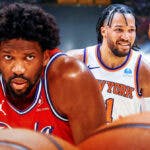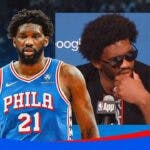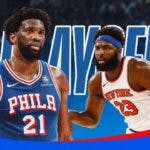The Philadelphia 76ers have seen plenty of elite-caliber players in their all-time depth chart since their early days. Today, we rank the top small forwards in Sixers history.
Clarence Weatherspoon
“Spoon” was sensational in his first five-and-change seasons, all of which he spent with the Sixers. From the moment he was picked with the ninth overall pick in the 1992 NBA Draft, it was clear he had a penchant for scoring.
That all changed, of course, once Allen Iverson was drafted with the first overall pick in the 1996 NBA Draft. Weatherspoon took a more secondary role and was traded along with Jim Jackson to the Golden State Warriors for Joe Smith and Brian Shaw upon the arrival of new coach Larry Brown.
Weatherspoon put up a strong 15.3 points, 8.3 rebounds, 2.0 assists, 1.2 steals, and 1.1 blocks per game as an all-around talent. He would, however, never again enjoy the same opportunity that he had in his first four years with the team.
Andre Iguodala
One of the most iconic contemporaries, Iggy spent his first eight seasons in The City of Brotherly Love. Before he was put on the injury management/reserve role with the Golden State Warriors, he was a four-time league leader in games played, having made 82 appearances in five of his first six seasons in the league.
The Arizona product came into the league as an athletic wing with excellent defensive capabilities, traits he's been able to keep well into his thirties. His scoring ability began to show after Allen Iverson's trade to the Denver Nuggets in December 2006 took over all the attention of Sixers news outlets, averaging 18.2 points per game in his third season.
While he got his lone All-Star nod in his last year in Philadelphia, Iguodala wouldn't see true glory until he took off the Sixers uniform. He became a hot commodity in his lone year with the Nuggets, which he transformed into a six-year partnership with the Warriors, yielding three titles and a Finals MVP.
Well-rounded averages of 15.3 points, 5.8 rebounds, 4.9 assists, and 1.7 steals per game through eight seasons in Philly make him a surefire nod in this list.
Chet Walker
Chet “The Jet” Walker spent his first seven seasons with the franchise — his first with the Syracuse Nationals, which then relocated and rebranded as the Philadelphia 76ers in 1963. Walker earned three of his seven All-Star nods with the 76ers and won a title with them in 1967.
He got to be a part of one of the most dominant teams of all-time, playing next to Wilt Chamberlain, Hal Greer, Wali Jones, and sixth man extraordinaire Billy Cunningham in that 1966-67 season. That Sixers team ended the eight-year championship streak of the Boston Celtics.
Walker averaged 16.2 points, 7.9 rebounds, and 1.8 assists per game in his time with the franchise, indisputably deserving a seat at the table among the greats at his position.
Billy Cunningham
“The Kangaroo Kid” is one of the most iconic Sixers of all-time. Cunningham was a four-time All-Star despite breaking into the league as a sixth man, playing well enough to earn himself a spot in the All-Rookie First Team in 1966.
He won a championship with Wilt Chamberlain, Hal Greer, and the aforementioned Chet Walker in 1967, but his career started to take off in 1968-69, once Chamberlain left the team and he became the Sixers' franchise gem.
In 1972, he joined the Carolina Cougars of the American Basketball Association, averaging 24.1 points and 12.0 rebounds per game, while leading the league in total steals. Cunningham led the Cougars to the best record in the league, was selected to the All-ABA First Team, and then named league MVP.
After a two-year foray in the ABA, Cunningham returned to the Sixers for two more seasons before calling it a wrap in 1976. His averages of 20.8 points, 10.1 rebounds, 4.0 assists, and 1.2 steals per game make him a surefire great at small forward.
Julius Erving
Undoubtedly the most iconic name at the position. Julius “Dr. J” Erving is perhaps the player most symbolic to the organization and still a face that is graciously seen in the stands to this day.
Erving earned that, spending all 11 of his NBA seasons with the 76ers after playing two seasons with the Virginia Squires and three more with the New York Nets of the American Basketball Association.
His crossover to the NBA is legendary. After spending five seasons in the ABA, the Nets were on a shaky financial ground upon joining the NBA and were forced to pay a fee to enter the league. Owner Roy Boe walked back a promise to raise Erving's salary. Erving held out in training camp and many NBA suitors started to send their offers to the cash-needy Nets.
The Sixers offered to buy Erving's contract for $3 million and to pay the expansion fee of nearly the same amount, a $6 million deal Boe couldn't refuse. Philadelphia had beat other giants of the sport like the Los Angeles Lakers, Milwaukee Bucks, and New York Knicks for the prized small forward.

Erving was not only a showman but a proven winner, having won titles with the Nets in 1974 and 1976, earning Playoffs MVP honors on both occasions. He was a five-time All-Star in the ABA and went on to make 11 All-Star appearances in each of his 11 seasons with the Sixers, as well as winning a title in 1983.
His NBA resume is as decorated as it gets: NBA MVP in 1981, two-time All-Star MVP, five-time All-NBA First Team, two-time All-NBA Second Team, as well as the 1976 ABA Slam Dunk champion. He averaged 22.0 points, 6.7 rebounds, 3.9 assists, 1.8 steals, and 1.5 blocks in his tenure with the Sixers.
Erving's impressive airborne acrobatics, syrupy-smooth jump shot, and penchant for big moments made him one of the biggest idols of the '70s and '80s and a no-brainer selection as the top name in this list.




